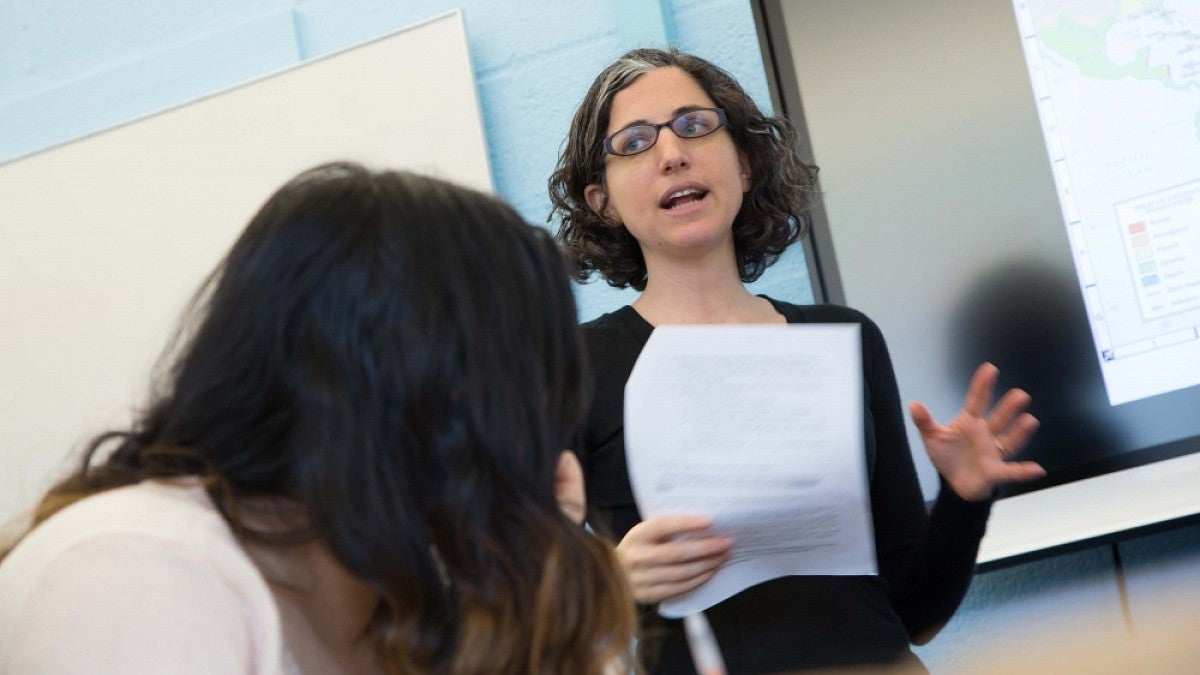Julie Weise, an associate professor of history, has been awarded a $50,000 public-engagement grant to take her Nuestro South project to the next level, building on a successful podcast series to create a five-part YouTube series.
The YouTube series will showcase the long history of Latinx life in the Deep South, celebrating 100 years of Latinx culture and contributions in the region. The grant was awarded by the Whiting Foundation.
Weise’s work will build on a previous seed grant she received in 2018, also from the Whiting Foundation, which was matched by the dean of the College of Arts and Sciences. She used the funding to collaborate with a team of media-savvy Latinx community leaders and college students to create the Nuestro South podcast.
The podcast filters historical scholarship on Latinx people in the South through the lens of youth who are discovering and celebrating their roots in the region.
“This new dimension in my career has been unexpected and wonderful as I work with brilliant partners to provide the region’s Latinx youth an opportunity to discover the histories of their forebears,” Weise said.
Phil Scher, divisional dean for social science in the College of Arts and Sciences, said the award stands out because it helps make research accessible to the general public.
“Professor Weise has achieved something important for any scholar: She has been able to take her academic research and scholarship to new audiences outside of the academy,” he said. “The Whiting is a wonderful acknowledgement of the kind of exemplary public engagement we value so deeply at the University of Oregon.”
Weise said that for the hundreds of thousands of Latinx youth living in the Deep South, many of whom are children of immigrants who settled during a wave of migration in the 1990s, it can be challenging to understand how they fit into the standard schoolbook history of a black-and-white South. Yet, the history of Southern Latinx communities dates back more than a century.
Her 2015 book, “Corazón de Dixie: Mexicanos in the U.S. South since 1910,” pioneered scholarship on this under-studied subject, illuminating the lives of Mexican merchants and laborers in interwar New Orleans, Mexican sharecroppers in the Mississippi Delta, bracero guest workers in Arkansas, migrant workers in rural Georgia and immigrant settlement in the exurbs of Charlotte in the 1990s.
After her book was published, Weise did some radio interviews in the South. Among those who heard her was Erik Valera, a nonprofit leader and community activist in North Carolina. Valera reached out to Weise to say that he felt the stories and insight she presented were very important and that he wanted to explore how to make them accessible to others in the community.
“He said he wanted to see the histories from my book on the smartphone of every Latinx young person in the South,” Weise recalls. “As you can imagine, I pretty much fell off my couch. He had faith that the community really cared about this history, and he was right.”
This was the origin of the podcast and now the YouTube series.
With the new Whiting award, Weise and her collaborators will take an extended road trip around the South to shoot and edit the YouTube series. In each stop on their trip, college student hosts will interview Southerners about their and their families’ connection to local Latinx history, retell the stories of Mexican immigration to the area, and engage local young people in conversations about the past.
“The video series and accompanying social media engagement will give Latinx youth a platform to explore their identities, shape their narrative of belonging and see reflections of themselves in historical figures who worked, raised families and fought for justice in the U.S. South,” Weise said.
The Whiting Public Engagement Program is a national grant founded to champion the public humanities in all its forms and to highlight the roles scholars play in using the humanities to advance communities around the country. Weise’s grant was one of 14 awarded to scholars who are tackling pressing challenges in communities.
“The judges were deeply impressed with the way Dr. Weise has developed the Nuestro South collaboration,” said Daniel Reid, executive director of the Whiting Foundation. “They see her proposed next steps as a model for how to bring fresh scholarship to a public who will not only be interested but will be transformed by it.”
—By Lisa Raleigh, College of Arts and Sciences


